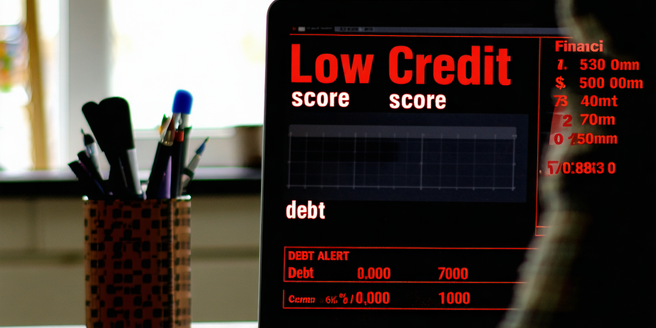
Understanding Bad Credit
| Aspect | Explanation | Impact |
| Credit Score | A numerical expression of creditworthiness. | Low scores limit financing options. |
| Credit History | Record of a borrower’s responsible repayment. | Poor history hinders loan approvals. |
| Income Level | Borrower’s earnings affect credit standing. | Lower income poses higher risk. |
| Payment Delays | Late payments decrease credit scores. | Increased interest rates. |
| Debt Amount | Total debt owed by a person or business. | High debt reduces borrowing capacity. |
| Credit Utilization | Ratio of credit card balances to limits. | Higher ratios lower scores. |
Common Causes of Bad Credit Scores
Bad credit scores can stem from various sources, making it crucial to understand what might be harming your score. Late or missed payments on loans and credit cards are one of the most direct causes. Each late payment can tarnish your credit report and drag down your score. High credit card balances relative to your credit limit can also negatively impact your score. This factor is known as credit utilization and aims to gauge how reliant one is on credit funds. Furthermore, a short credit history can be a limitation, often affecting younger individuals or those new to credit. Other factors like loan defaults, bankruptcies, and high-frequency credit inquiries can cumulatively contribute to a worsening score, thus limiting financial opportunities.
The Impact of Bad Credit on Financing Options
A poor credit score can significantly limit one’s financing avenues, often resulting in subpar loan options compared to those with healthier credit scores. Lenders tend to perceive individuals with bad credit as high-risk borrowers, leading to higher interest rates on loans as a protective measure against potential defaults. In many cases, individuals may face outright rejection from certain financial institutions for credit applications. This can be particularly frustrating for those trying to rebuild their financial stability. Even if approved, the terms might be financially strenuous, requiring larger down payments or more stringent conditions. This situation can create a cycle where struggling to meet these conditions further deteriorates the borrower’s credit standing, making improvements and financial mobility even more challenging.
Exploring Traditional vs. Non-Traditional Lenders
When dealing with bad credit, understanding the landscape between traditional and non-traditional lenders becomes crucial. Traditional lenders, like banks and credit unions, typically have stringent credit requirements, offering better terms only to those with exemplary credit histories. However, their rigorous scrutiny can be discouraging for those with poor credit. On the other hand, non-traditional lenders, such as online platforms, peer-to-peer networks, and payday lenders, often cater to those with less than stellar credit by offering more lenient qualification criteria. They tend to provide quicker access to funding, though usually at the cost of higher interest rates and fees. Borrowers must assess their needs and capabilities to choose the best fit for their financial future.
How to Prepare for a Bad Credit Loan Application
Preparation is key when applying for a loan with bad credit, which can significantly increase your chances of approval and better terms. Start by thoroughly reviewing your credit report to understand your financial standing, ensuring to dispute any inaccuracies that could unnecessarily harm your score. Compile substantial documentation that demonstrates your ability to repay the loan, including proof of income, employment stability, and monthly expense records. Researching various lenders and understanding their specific requirements can also give you a competitive edge. It’s also wise to save for a larger down payment, as this shows commitment and reduces the lender’s perceived risk. Additionally, consider securing a co-signer with a strong credit profile to boost your credibility, providing lenders with added assurance.
Top Bad Credit Financing Options Available
Individuals with bad credit still have access to multiple financing options, despite the challenges. One of the most popular routes is a secured personal loan, which leverages an asset like a vehicle or savings account as collateral. This security can lead to better terms despite a low credit score. Additionally, credit builder loans, specifically designed to improve credit, help customers build credit through timely payments. It’s important to research each option carefully to find the best fit for your financial situation. Another alternative includes seeking loans from community banks or credit unions, as they often have programs tailored for those with financial struggles. Lastly, peer-to-peer lending platforms connect borrowers directly with investors, bypassing traditional banking assessments.
Tips for Improving Your Credit Score Over Time
Improving a credit score is a gradual process requiring consistent effort and smart financial decisions. Begin by making timely payments on all existing debts, as late payments serve as a major detriment to credit health. Try to reduce credit card balances, keeping the credit utilization ratio ideally below 30%. Consider setting financial goals to guide your efforts and keep you motivated. It’s important to manage the opening of new credit lines cautiously as excessive inquiries and new accounts within a short period can lower your score. Keeping old accounts open helps build a long credit history, enhancing creditworthiness. Additionally, regularly reviewing and disputing any errors on your credit report can prevent unwarranted damage to your score.
Understanding Interest Rates and Loan Terms
Interest rates and loan terms play a crucial role in determining the affordability and feasibility of any credit product. Interest rates reflect the cost of borrowing money, expressed as a percentage of the loan principal, and can vary widely based on credit score, lender type, and loan conditions. Bad credit often results in higher interest rates, increasing the total repayment amount. Understanding the difference between fixed and variable rates is essential; fixed rates remain constant throughout the loan term, while variable rates may fluctuate. Loan terms specify the duration over which the loan must be repaid. Longer terms may reduce monthly payments, but can also result in higher total interest payments over time.
Avoiding Scams and Predatory Lending Practices
When seeking financing with bad credit, it’s vital to remain vigilant against scams and predatory lending practices designed to exploit financially vulnerable individuals. Look for red flags such as lenders who guarantee approval regardless of credit history without assessing your financial situation. Be wary of excessive fees that are charged upfront, as legitimate lenders typically do not require large initial payments. Always take time to compare different offers to ensure you’re getting the best deal possible. Ensure all terms and conditions are thoroughly explained and documented, and do not rely on verbal promises. Checking the lender’s reputation through reviews or credit union memberships can help identify trustworthy options, reducing the likelihood of falling victim to unscrupulous lenders.
Legal Rights and Protections for Borrowers
Borrowers have specific legal rights and protections that shield them from unfair practices and help maintain consumer confidence in the financial sector. The Fair Credit Reporting Act enforces the accuracy and privacy of credit reports, granting individuals the right to dispute any incorrect information. The Truth in Lending Act ensures transparency, requiring lenders to disclose all credit terms and associated costs upfront. One important aspect of financial literacy is being aware of these legal protections. Meanwhile, the Equal Credit Opportunity Act prohibits lenders from discriminating against applicants based on race, gender, or age. By understanding these and other protections, borrowers can navigate the borrowing process more confidently, safeguarding themselves against potential exploitation and ensuring fair treatment.

